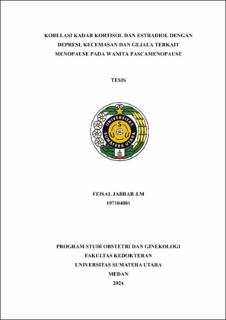Korelasi Kadar Kortisol dan Estradiol dengan Depresi, Kecemasan dan Gejala Terkait Menopause pada Wanita Pascamenopause
The Correlation between Cortisol and Estradiol Levels with Depression, Anxiety, and Menopause-Related Symptoms in Postmenopausal Women

Date
2024Author
M, Feisal Jabbar J
Advisor(s)
Siregar, Muhammad Fidel Ganis
Effendy, Elmeida
Metadata
Show full item recordAbstract
Background. Menopause is defined as the permanent cessation of menstrual cycles
due to loss of ovarian follicular function. It is often accompanied by significant
physical and mental changes, including vasomotor symptoms, osteoporosis,
cardiovascular disease, and cognitive and psychological problems such as
depression and anxiety. It is estimated that by 2030, 1.2 billion women will be in
the menopause or postmenopausal period.
Methodology. This study is an analytic study with a cross sectional design to assess
the relationship of salivary cortisol and estradiol levels with depression, anxiety,
and menopause-related symptoms in Postmenopausal women. This study was
conducted at Department of Obstetric And Gynecology Faculty of Medicine
Universitas Sumatera Utara from August 2024 until the sample size was met.
Results. There was a positive correlation between cortisol levels with depression
and anxiety and menopause-related symptoms (p=0.30; p=0.038). Increased
cortisol levels increase the level of depression, anxiety and menopause-related
symptoms. Estradiol levels have a negative / opposite correlation, which means that
increasing estradiol levels can reduce the level of depression, anxiety and symptoms
related to menopause (p = 0.20, p = 0.042).
Conclusion. Cortisol and estradiol levels affect the level of depression, anxiety and
symptoms related to menopause.
Collections
- Master Theses [325]
